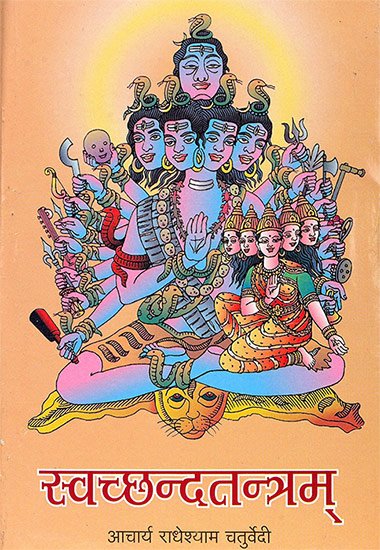Svacchanda-tantra [sanskrit]
30,869 words | ISBN-10: 8172700989 | ISBN-13: 9788172700980
The Sanskrit edition of the Svacchanda-tantra, a large work in the form of a manaul describing Kashmir Shaiva rituals. The extant Svacchandatantra contains over 3,000 shlokas (metrical verses) and highlights the worship of Svacchanda Bhairava (a fierce form of Shiva) and his consort Aghoreshvari. The text can be dated to at least the 7th century. Alternative titles: Svacchandatantra (स्वच्छन्दतन्त्र), Śrīsvacchandatantram (श्रीस्वच्छन्दतन्त्रम्, Shrisvacchandatantram)
Verse 7.32
अहोरात्रोदयस्त्यैव विभागं कथयामि ते ।
हृदयोर्ध्वे तु कण्ठाधो यावद्वै प्रवहेत्प्रिये ॥ ३२ ॥
ahorātrodayastyaiva vibhāgaṃ kathayāmi te |
hṛdayordhve tu kaṇṭhādho yāvadvai pravahetpriye || 32 ||
The Sanskrit text of Svacchanda-tantra Verse 7.32 is contained in the book Sri Svacchandatantram (Set of 5 Volumes) by Dr. Paramahansa Mishra (डॉ. परमहंस मिश्र). This book is not available online so in order to read the full text and translation you should buy the book:
Buy now! Sanskrit text by Dr. Paramahansa Mishra (डॉ. परमहंस मिश्र) (2004)
Glossary of Sanskrit terms
Note: This extracts Sanskrit terms and links to English definitions from the glossary, based on an experimental segmentation of verse (7.32). Some terms could be superfluous while some might not be mentioned. Click on the word to show English definitions.
Ahoratra, Udaya, Sti, Vibhaga, Tad, Yushmad, Hridaya, Urdhva, Kantha, Adhah, Adhas, Yavat, Pra, Pri, Priya,
Analysis of Sanskrit grammar
Note: this is an experimental feature and only shows the first possible analysis of the Sanskrit text (Svacchanda-tantra Verse 7.32). If the system was successful in segmenting the sentence, you will see of which words it is made up of, generally consisting of Nouns, Pronouns, Verbs, Participles and Indeclinables. Click on the link to show all possible derivations of the word.
- Line 1: “ahorātrodayastyaiva vibhāgaṃ kathayāmi te ”
- ahorātro -
-
ahorātra (noun, masculine)[compound], [vocative single]
- udaya -
-
udaya (noun, masculine)[compound], [vocative single]
- styai -
-
sti (noun, masculine)[compound], [adverb], [nominative dual], [vocative dual], [accusative dual]√styā (verb class 1)[present middle first single], [imperative middle first single]
- aiva -
-
√i (verb class 2)[imperfect active first dual]
- vibhāgam -
-
vibhāga (noun, masculine)[adverb], [accusative single]
- kathayāmi -
-
√kath (verb class 10)[present active first single]
- te -
-
ta (noun, masculine)[locative single]ta (noun, neuter)[nominative dual], [vocative dual], [accusative dual], [locative single]tā (noun, feminine)[nominative dual], [vocative single], [vocative dual], [accusative dual]tad (noun, neuter)[nominative dual], [accusative dual]sa (noun, masculine)[nominative plural]sā (noun, feminine)[nominative dual], [accusative dual]yuṣmad (pronoun, none)[dative single], [genitive single]
- Line 2: “hṛdayordhve tu kaṇṭhādho yāvadvai pravahetpriye ”
- hṛdayo -
-
hṛdaya (noun, masculine)[compound], [vocative single]hṛdaya (noun, neuter)[compound], [vocative single]hṛdayā (noun, feminine)[nominative single]
- ūrdhve -
-
ūrdhva (noun, masculine)[locative single]ūrdhva (noun, neuter)[nominative dual], [vocative dual], [accusative dual], [locative single]ūrdhvā (noun, feminine)[nominative dual], [vocative single], [vocative dual], [accusative dual]
- tu -
-
tu (indeclinable particle)[indeclinable particle]
- kaṇṭhā -
-
kaṇṭha (noun, masculine)[compound], [vocative single]√kaṇṭh (verb class 1)[imperative active second single]
- adho* -
-
adhaḥ (indeclinable preposition)[indeclinable preposition]adhaḥ (indeclinable)[indeclinable]adhas (noun, neuter)[compound], [nominative single], [vocative single], [accusative single]
- yāvad -
-
yāvat (indeclinable)[indeclinable]yāvat (indeclinable relative)[indeclinable relative]yāvat (noun, masculine)[compound]yāvat (noun, neuter)[nominative single], [vocative single], [accusative single]
- vai -
-
√vā (verb class 1)[present middle first single], [imperative middle first single]
- pra -
-
pra (noun, masculine)[compound], [vocative single]pra (noun, neuter)[compound], [vocative single]pra (Preverb)[Preverb]
- vahet -
-
√vah (verb class 1)[optative active third single]
- priye -
-
prī (noun, masculine)[dative single]prī (noun, feminine)[dative single]priya (noun, masculine)[locative single]priya (noun, neuter)[nominative dual], [vocative dual], [accusative dual], [locative single]priyā (noun, feminine)[nominative dual], [vocative single], [vocative dual], [accusative dual]√pṛ (verb class 3)[present passive first single]√pṛ (verb class 9)[present passive first single]√pṛ (verb class 5)[present passive first single]√pṛ (verb class 6)[present middle first single], [present passive first single]
Other editions:
Also see the following editions of the Sanskrit text or (alternative) English translations of the Svacchanda-tantra Verse 7.32
Svacchandatantram (Two Volumes)
by Prof.Radheyshyam Chaturvedi (2004)
With the Commentary Svacchandodyota by Acarya Sri Ksemaraja and Jnanavati; [Sanskrit Text With Hindi Translation]; [स्व्छ्न्द्तन्त्रम]; [Chaukhambha Vidya Bhawan]
Buy now!![Svacchanda-tantra [sanskrit] - book cover](/uploads/a/Svacchanda-Tantra-Sanskrit.jpg)
